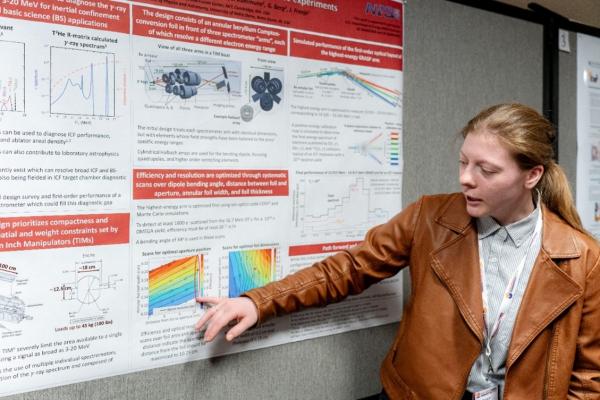
Skylar Dannhoff
Xinyan Wang
May 8, 2024
Skylar Dannhoff, a third-year graduate student in the Department of Physics has been awarded the prestigious 2024 Department of Energy National Nuclear Security Administration Laboratory Residency Graduate Fellowship (DOE NNSA LRGF).
Under supervision of Drs. Chikang Li and Johan Frenje, Dannhoff studies electric and magnetic fields generated in a hohlraum plasma in an indirect-drive Inertial Confinement Fusion (ICF) experiment, in addition to building nuclear diagnostics for studies of ICF and High Energy Density (HED) plasmas. For her LRGF GF residency, Dannhoff will work under the mentorship of Dr. Chris Walsh at the Lawrence Livermore National Laboratory (LLNL) studying the impact of self-generated electric and magnetic fields in laser-driven ICF experiments. Dannhoff said, “I feel incredible lucky to have been offered the opportunity to work so closely with and learn from the expertise of LLNL scientists. I think this fellowship and my residencies with LLNL will add to both the depth and the broader utility of my research, and I'm grateful to my current and past research advisors, mentors, and group members for their support and encouragement.” Her direct MIT supervisor on this project, Dr. Chikang Li, commented, “The LRGF program provides a unique opportunity allowing Skylar not only to perform comprehensive magnetohydrodynamic (MHD) simulations for her PhD thesis projects, but also get exposed to, and communicate with, scientists at the national laboratories.”
The DOE NNSA LRGF connects students working in fields relevant to the DOE lab system with laboratory scientists with the aim of fostering collaborative research relationships. The program will strengthen these university-laboratory links through an unusual and exciting provision: fellows will work and study in residence at one or more of four approved DOE NNSA facilities for a minimum of two 12-week periods. This residency requirement opens compelling research opportunities to students and their advisors, including access to unique DOE NNSA experimental and computing facilities. Additionally, by training researchers in advanced science and engineering, the fellowship is helping to fill key gaps in the U.S. workforce.